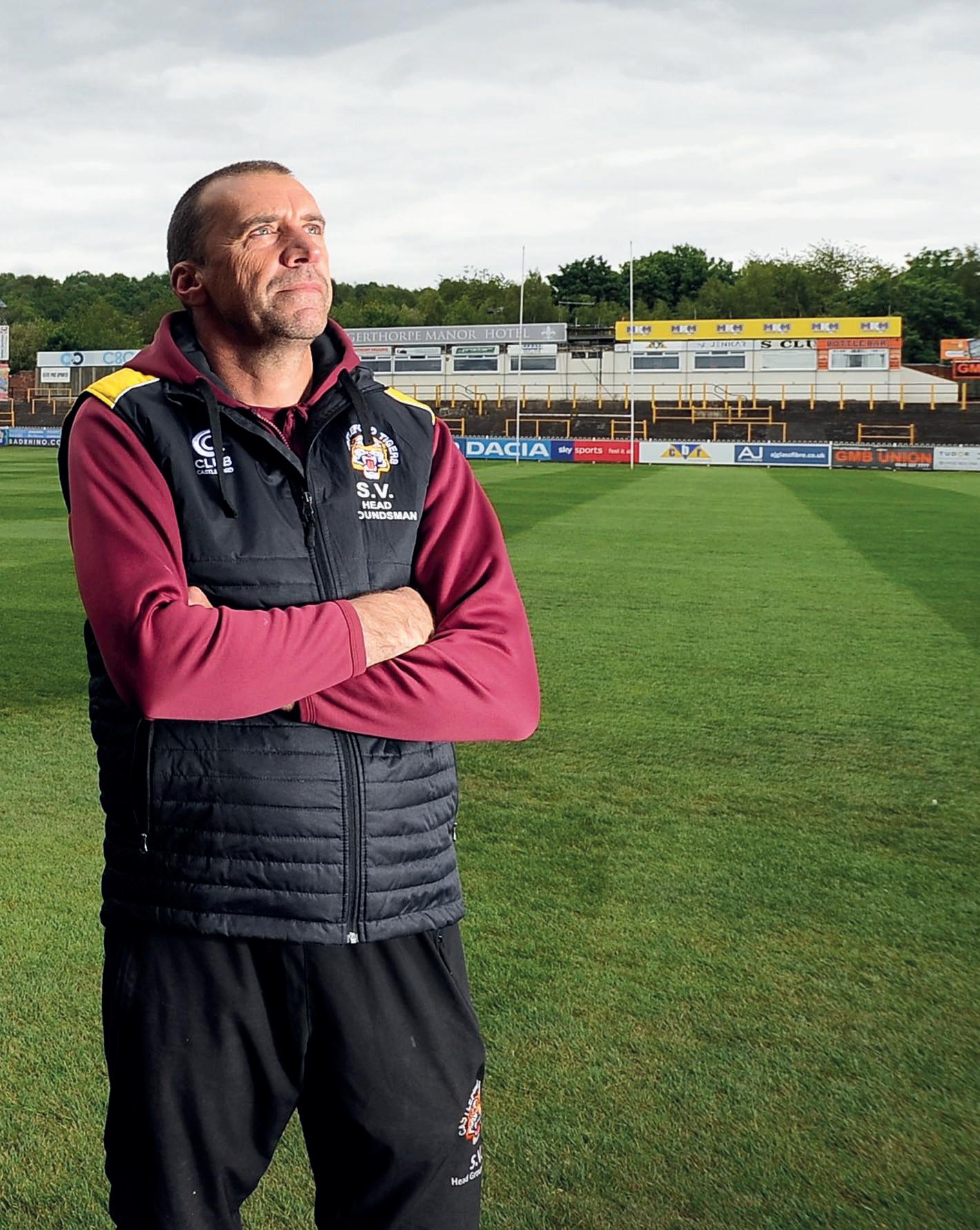
4 minute read
Best practice: Castleford Tigers
Andy Carmichael Freelance writer
LOOKING GOOD AT WHELDON ROAD
Castleford Tigers’ head groundsperson Stuart Vause has an enviable record in the GMA Industry Awards over the past six years – being a finalist in the rugby league category every year and winning the accolade twice
I WOULD HAVE LOVED to report that Stuart Vause, head groundsman of Castleford Tigers’ Mend-a-Hose Jungle stadium, is happy with how the pitch is coping with the onslaught of a Super League season. But sadly, in these unusual times, the closest a lot of us are getting to this vision are images on social media of beautifully manicured sports pitches desperately needing players. So, instead, I will settle for confirming that the boot room he is FaceTiming me from looks immaculate.
Stuart and his assistant, Rob Lilley, the 2019 GMA Professional Rugby Football League Grounds Team of the Year, are following Government guidance and managing to work safely at the club. There are always plenty of jobs for Stuart, not only as head grounds manager, but also as kit man and as the club’s all-round chief maintainer and fixer. His assistant Rob helps with tasks and Stuart is quick to point out that “the club has been really good” for keeping the two of

them on full time during the Covid-19 crisis. It is good for both parties though. Not only does the club benefit from the security of having someone overseeing the facility but, when we return to better times, the first team pitch and training surface should be in peak condition.
Both turf grass surfaces are benefitting from the enforced break and greater freedom that Stuart has in his management decisions, with a cut every other day. Usually the use of the pitches is high, with everything from charity matches for children, to academy, reserves, women’s teams and the Castleford first team. “There is normally someone on them nearly every day,” says Stuart, “and training sessions can suddenly be extended.”
This can play havoc with planning maintenance activities but, he adds, “right now, I can do things I haven’t had the chance to do since I came here full time”. That was six years ago, but prior to that he spent 14 years as a volunteer at the Tigers, helping out while working in grounds care for the local authority.
Weathering well
In that time there have been a few challenges. The stadium, on Wheldon Road in the Yorkshire town, lies a couple of hundred yards from the river Aire. The pitch was a native clay soil development, first played on by the club in 1927, and has no artificial drainage network. When it rains, it runs off the terraces onto the turf. Stuart recognises the difficulties this poses, but approaches it as simply needing “to make the best of a bad situation” and laughs that “it wasn’t as bad as the Beast from the East in 2018”. And not a match of that new season was missed. Thanks to a policy of decompaction in the close season and amelioration of the profile with increasing amounts of sand over the last few years (initially 20 tonnes, building up to 100 tonnes this year), the pitch absorbs the worst of the weather, with the excess being pumped away.
Helping his efforts has been Russells Groundcare, a supplier of materials and support, and “a big Tigers fan”. That link with people in the sport is something Stuart returns to several times in our chat. He says he has become “good mates” with the players and has “established a level of trust” that is so important in difficult circumstances. Even at the top most players are very approachable, something Stuart ascribes to them being “workingclass lads who don’t forget where they come from”. This is why sport matters in communities such as Castleford. The current absence of sport has been keenly felt.
Last year saw Stuart’s second win in the GMA awards and he has contested the final two places in the rugby league award category every year since going full time. Initially his runner-up status was a chance for a bit of good-natured joking at the club. But staff appreciated he was competing against bigger clubs with more people and greater resources, particularly after winning in 2017, when matched with Leeds Rhinos. What might have previously “just been considered a piece of grass”, says Stuart, “is now a focal point”.
Stuart does not have a fixed budget but the club has never turned down a request for something that will help raise the quality of the surface, and he receives lots of positive comments from management and players alike.
It is possible the future may hold greater change for Stuart, the club having been the subject of a longmooted move to a new development. The area had planning permission granted for a large retail scheme and stadium several years ago, but there is now the uncertainty of the status of many of the proposed high-street name tenants. It is not something worrying Stuart and Castleford Tigers though. They will carry on hosting rugby league at Wheldon Road until decisions are made, and fans should be assured that, even though they cannot currently see it, their pitch is receiving first-class care and attention. ■









